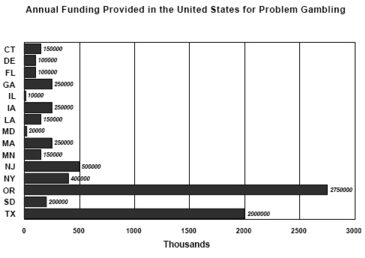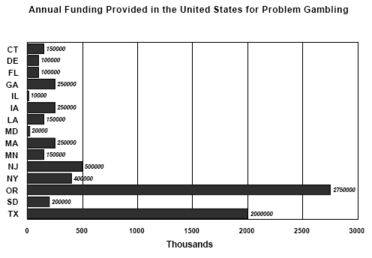In 1981, Connecticut established the first publicly-funded outpatient treatment program for problem gamblers. Currently, state support for education, prevention, treatment, or research focusing on problem gambling ranges from $20,000 to $2.75 million. Funding for problem gambling in the United States has been provided through various mechanisms: (1) on an annual basis through legislative appropriation, (2) in appropriations mandated in legislation establishing new types of gambling, and (3) direct funding by the private sector, including the gaming industry. Funded services include programs that provide individual and group counseling, crisis counseling, outreach (public education and information), outpatient treatment programs, hot lines, and problem gambling treatment training for addictions and mental health service providers. Prevalence studies often stimulate the development of services for problem gamblers. Although prevalence often is interpreted as synonymous with treatment need, there are important distinctions between prevalence, treatment need and treatment demand. For example, all those with gambling problems will not necessarily seek treatment.
Source: Volberg, R.A., Dickerson, M.G., Ladouceur, R., & Abbott, M.W. (1996). Prevalence studies and the development of services for problem gamblers and their families. Journal of Gambling Studies, 12, 215-231.
This public education project is funded, in part, by The Andrews Foundation and the Massachusetts Department of Public Health.
This fax may be copied without permission. Please cite The WAGER as the source.
For more information contact the Massachusetts Council on Compulsive Gambling,
190 High Street, Suite 6, Boston, MA 02110.





